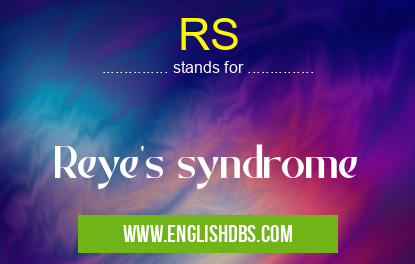What does RS mean in NEUROLOGY
Reye's syndrome (RS) is a rare but severe condition that affects the brain and liver. It typically develops in children and adolescents who have recently recovered from a viral infection, such as the flu or chickenpox. The exact cause of RS is unknown, but it is thought to be related to a reaction to certain medications, such as aspirin.

RS meaning in Neurology in Medical
RS mostly used in an acronym Neurology in Category Medical that means Reye's syndrome
Shorthand: RS,
Full Form: Reye's syndrome
For more information of "Reye's syndrome", see the section below.
Symptoms
- Vomiting
- Lethargy
- Confusion
- Seizures
- Coma
Diagnosis
The diagnosis of RS is based on a combination of symptoms, physical examination, and laboratory tests. Blood tests can show elevated levels of liver enzymes and ammonia. A liver biopsy may also be performed to confirm the diagnosis.
Treatment
There is no specific cure for RS, but treatment can help to manage the symptoms and improve the chances of survival. Treatment may include:
- Intravenous fluids to correct dehydration
- Electrolytes to balance electrolyte levels
- Anticonvulsants to control seizures
- Liver transplant in severe cases
Essential Questions and Answers on Reye's syndrome in "MEDICAL»NEUROLOGY"
What is Reye's syndrome (RS)?
RS is a rare but serious condition that primarily affects children and teenagers. It is characterized by swelling and inflammation in the brain and liver.
What causes RS?
RS is most commonly associated with aspirin use during viral infections, especially chickenpox and influenza. However, it can also be triggered by other viral infections, toxins, or metabolic disorders.
What are the symptoms of RS?
Early symptoms include persistent vomiting, lethargy, and confusion. As the condition progresses, seizures, coma, and respiratory failure can occur.
How is RS diagnosed?
Diagnosis involves a physical examination, medical history, and blood tests. A liver biopsy may also be performed to confirm the diagnosis.
Is RS treatable?
There is no specific cure for RS. Treatment focuses on supportive care, such as managing seizures, providing respiratory support, and preventing further brain damage.
Can RS be prevented?
The most effective way to prevent RS is to avoid giving aspirin to children and teenagers, especially during viral infections. Other preventive measures include vaccination against chickenpox and influenza and avoiding exposure to toxins.
What is the prognosis for RS?
The prognosis for RS varies, depending on the severity of the condition. About one-third of patients recover completely, one-third suffer permanent neurological or intellectual disabilities, and one-third die.
Final Words: RS is a serious condition that can be fatal if not treated promptly. Early diagnosis and treatment are essential to improve the chances of survival. Parents and caregivers should be aware of the symptoms of RS and seek medical attention immediately if they occur.
RS also stands for: |
|
| All stands for RS |
